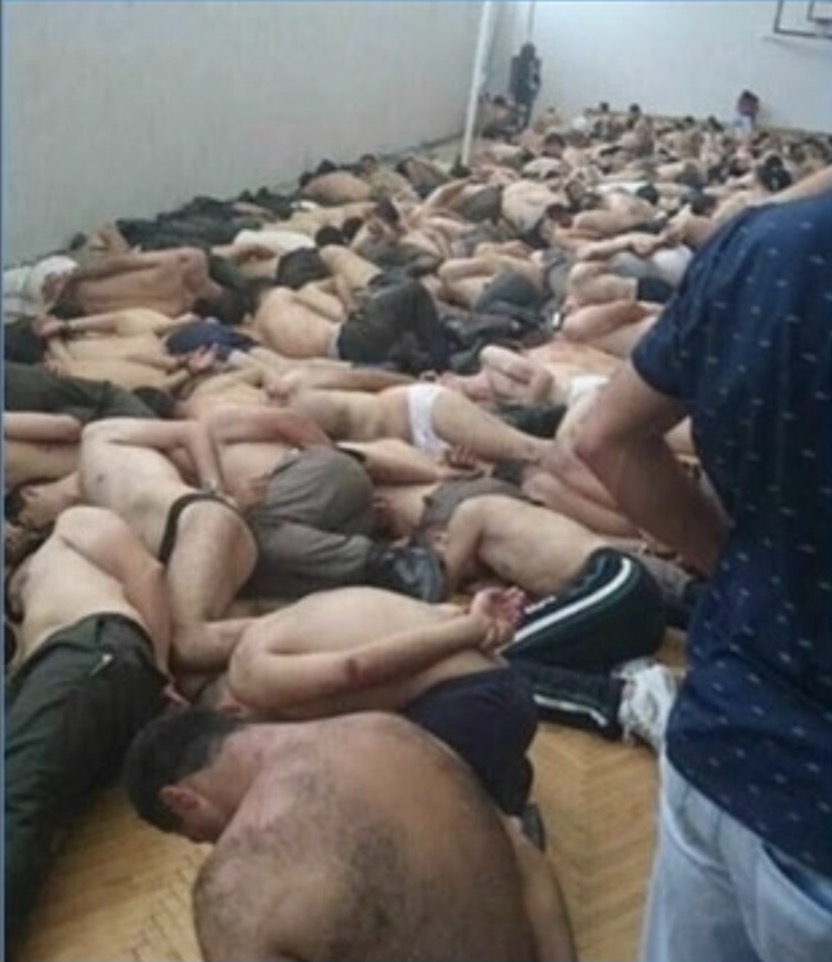Turkish police told a lieutenant colonel who was detained and tortured in custody that his wife and two daughters, 15 and 2, were considered concubines and the spoils of war, echoing the perverted mindset of Islamic State in Iraq and Syria (ISIS) militants who regarded captive women and girls as sex slaves.
According to the transcript of court testimony delivered on March 5, 2018 by Lt. Col. Şahin Karatekin, a 44-year-old decorated officer and veteran who worked in the operations department of the Land Forces Command, the police told him and other senior officers in custody that their wives and daughters were considered spoils of war.
“This was the most painful thing for me,” Karatekin said as he recollected the torture and ill-treatment he suffered at the hands of the police when he was detained on coup plotting charges on July 20, 2016.
“It weighs on you heavily when you hear the police saying that we’ll do this and that to your wife and your daughters. One of my daughters is 15 years old, your Honor. My little girl is 2 years old. And you can’t do anything about it because you’re in handcuffs,” he added.
Karatekin was one of the thousands of officers who were kept at unofficial detention sites in the aftermath of a failed coup on July 15, 2016 and subjected to torture for days before they were locked up in prison without charges or due process.
“Lt. Gen. Hasan Hüseyin Demirarslan was standing next to me. He passed out [from what he heard from the police about sex slaves],” Karatekin recalled.
Karatekin found himself in a chaotic situation on the night of July 15 during which special forces were deployed to protect the headquarters of the General Staff against a possible terrorist attack. He said in his defense that he had followed the chain of command and was not involved in any coup plotting activity.
However, the Turkish government was keen to push forward with the false narrative of a coup attempt when in fact the very limited mobilization in the military was nothing but a false flag plot orchestrated by President Recep Tayyip Erdoğan and his intelligence and military chiefs to create a pretext for a state of emergency that led to an “imperial” presidency, suspension of the rule of law and military incursions into Syria.
Several torture sites were specifically set up by the police and the intelligence agency in Ankara to round up thousands of military officers and force them to incriminate themselves with false statements in order to shore up the government storyline. Many officers were subjected to brutal torture and and had to sign prepared statements written by the police according to the government’s directives.
Karatekin reported to Central Command on July 18 to explain what he did and where he was during the July 15 events but was told to go home as there was no legal action against him at the time. He went to the command the next day, insisting that he wanted to relate what he had experienced on the night of the coup. This time around, the military prosecutor referred him to the police without even bothering to take his statement. In the early hours of July 20, he and several senior generals were taken to the Ankara police department’s counterterrorism building.
“[Upon arrival] we were thrown out of the vehicle like sacks by plainclothes police officers. … Lifted off the ground, we were ordered to face a wall, and our hands were tightly cuffed behind our backs. We were beaten with batons for a long time by police officers who kept swearing at us. … Your Honor, as we were beaten with batons in front of the wall, unspeakable insults and profanities were hurled at our most sacred values by the police, and our family members were being described by words I would be ashamed to repeat before your honorable court,” Karatekin said in describing his first encounter with police brutality.
He was then taken to a sports hall in the building that had been turned in an unofficial detention site. He and others were forced to strip in front of some 800 people who had already been brought there. He was given an orange T-shirt, black pants and slippers as the police said, “Welcome to Guantanamo.” They were forced to bend their knees and were beaten and kicked in front of others as part of what the police considered a welcome party.
Karatekin had a distinguished military career. He served in Kosovo and Iraq and earned veteran status for his valor and courage during counterterrorism operations in Turkey’s south. He was wounded twice and underwent surgery on his back, receiving 260 stitches by doctors who had managed to patch him up. He lost part of his left lung and received a medal for outstanding service.
At the torture site, when his shirt was removed, police noticed old bullet wounds and scars from the surgery. “When the cops saw the bullet wounds and scars on my body, they asked me what the hell they were. I said I was a veteran. When I said that, one police officer continued to beat me, cynically saying, ‘Did you become a veteran for us?’” Karatekin recalled. The police focused particularly on an exit wound in his back when he was getting beat up.
The torture, which lasted for days, did not stop at night, when detainees were forced to stay awake under high-powered projector lights. The police beat and kicked them in shifts. On the eighth day, there were some 30 to 40 people left at the site as most had been moved to prisons. Two plainclothes police officers took Karatekin to a basement and started to interrogate him. They were not happy with what they heard and kept pressuring him to sign a statement that had been prepared in advance. He did what he was told in order to free himself from the torture.
At his arraignment, the judge did not ask a single question, nor did he did allow Karatekin to speak. He was sent to Sincan Prison pending charges.
At the time of his detention, Karatekin was working for the Land Forces Command’s planning and operations department, where he had been assigned since September 2013. His job was to oversee projects on Turkey’s borders with Syria and Iraq. He was appointed battalion commander of the 66th Mechanized Infantry Brigade Command in Istanbul, but his transfer was delayed for over a month at the request of his commanding officers because they wanted him to finish up the last project he was involved with. If he had begun his new assignment as scheduled, he would have been in Istanbul on July 15.
He said in court that he could have easily fled Turkey if he had wanted because of his involvement in EU-funded projects on Turkey’s borders with Greece, Bulgaria, Syria and Iraq. But he voluntarily turned himself in since he knew he was innocent of any charges.
Karatekin said there were doctors and nurses whom the police brought to the site for medical examinations to satisfy the requirements of the Code on Criminal Procedure (CMUK). But under police pressure, doctors refused to write up the complaints made by the detainees and declined to record the torture and signs of abuse on their bodies. In fact, seven medical reports included in Karatekin’s file appear to have been filled in a hurry and after the fact. They indicated no torture or abuse. Some of the boxes were left unchecked, and no explanation was given as to whether the required conditions for a private medical checkup were provided. Karatekin filed a criminal complaint against the police officers who tortured him for days and the doctors who refused to record the torture in their reports when he was kept at the detention site between July 20 and 28, 2016.
His complaints fell on deaf ears as the Erdoğan government provided immunity for torturers through legal provisions. Torturers in Turkey were protected by a government decree issued by President Erdoğan that provided blanket immunity for officials who were involved in coup investigations. Decree-law No. 667, issued by the government on July 23, 2016, granted sweeping protections for law enforcement officers in order to prevent victims from pressing complaints of torture, ill treatment or abuse against officials. There were multiple cases in which Turkish prosecutors refused to investigate torture allegations, citing this decree-law, or KHK (Kanun Hükmünde Kararname).
Article 9 of this KHK stated that “Legal, administrative, financial and criminal liabilities shall not arise in respect of the persons who have adopted decisions and fulfill their duties within the scope of this decree-law.” The decree was criticized by human rights organizations for being a clear breach of articles of the International Covenant on Civil and Political Rights (ICCPR) as well as the European Convention on Human Rights, to which Turkey is a party, yet it was never annulled. In fact, the Turkish parliament passed the decree into law on October 18, 2016. Another KHK issued by the Erdoğan government even extended immunity to civilians.
As of today, no prosecution has been initiated against people who tortured detainees under police custody or in prisons despite multiple complaints filed by the victims and their lawyers.
In the final hearing of the sham trial on November 26, 2020, Karatekin was convicted and sentenced to aggravated life.
By: Abdullah Bozkurt
Source: Nordic Monitor



